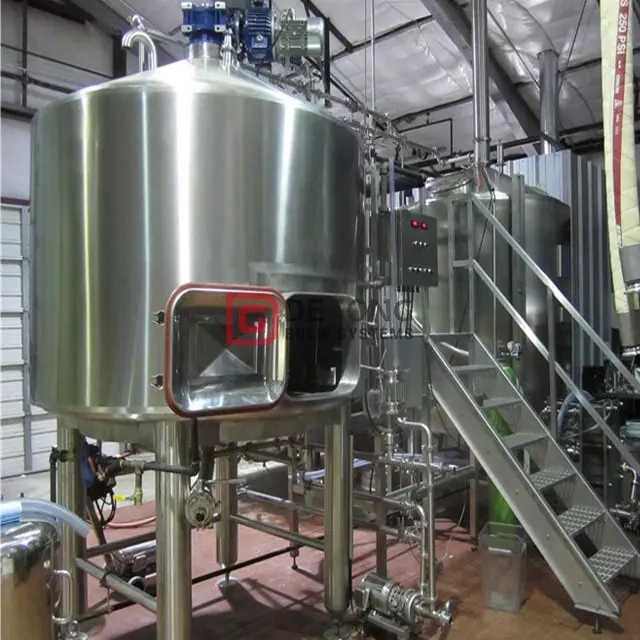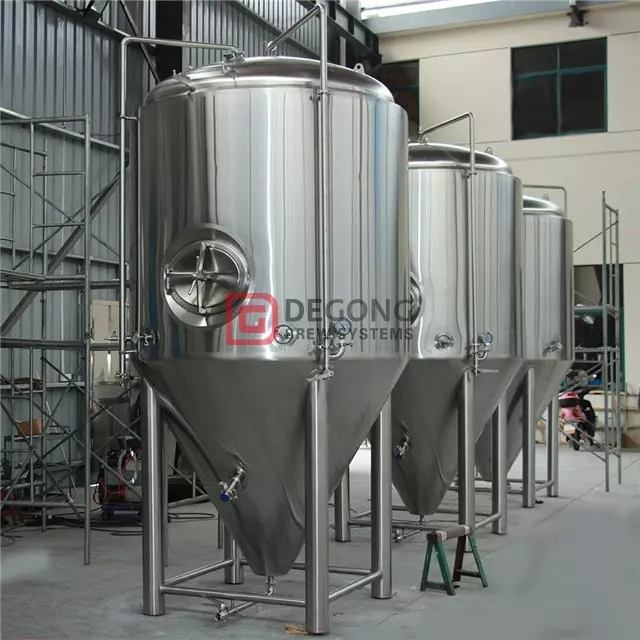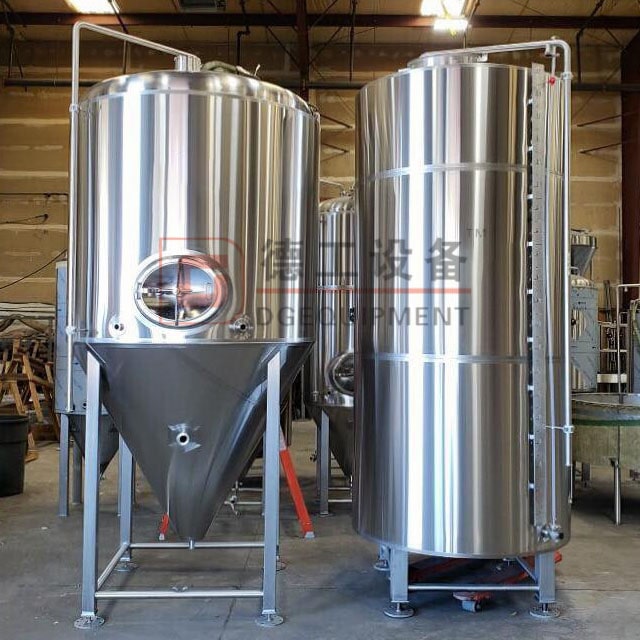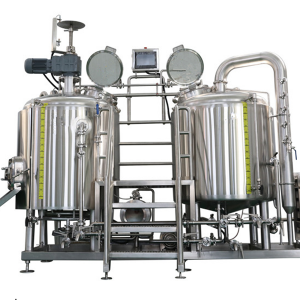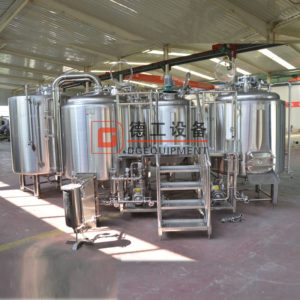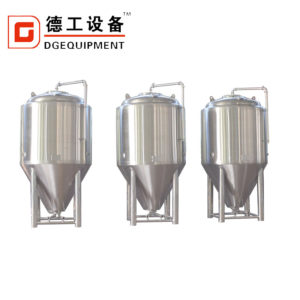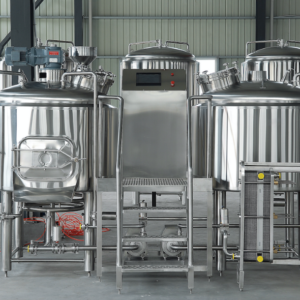Description

Commercial brewing equipment with hopper
Beer brewing requires four raw materials:
Barley, hops, water and yeast. The quality of these raw materials determines the quality of the beer produced.
1. Barley: the main raw material for beer brewing. Barley is used because it has a higher starch content. At the same time, from the threshing of the barly to the malt, the bark is always attached to the malt, which can form the necessary filter layer in the subsequent production process. Before a brewery produces beer, it must process barley into malt.
2. Hops:
a. Make beer with refreshing aroma, bitterness and antiseptic.
b. Forming excellent beer foam. Excellent hops and malt can brew white, delicate, rich and long-lasting beer foam.
c. Conducive to the clarification of wort. In the process of wort boiling, due to the addition of hops, the protein in the wort can be complexed out, thereby clarifying the wort and brewing pure beer.
3. Water: Water is the most used raw material when brewing beer. Brewer water affects the characteristics and quality of beer through the production process.
4. Yeast: Alcoholic fermentation of beer is carried out by yeast, so beer brewing inevitably requires yeast, and the by-products of yeast have a great influence on beer quality.
| Brewhouse system Features: |
Brewhouse is the most important process in the preparation of wort. Through the mashing process, it is the insoluble substance in the malt powder that is converted into a water-soluble substance.

2 vessel brewhouse brewery
Brewhouse Details:
Mash & Lauter tun used for producing craft beer
Made of stainless steel 304.
Exterior walls completely welded with TIG welding, with 100mm of insulation in the bottom of the tank and in the walls.
Mirror polished interior.
Integrated jacketing system with laser at the bottom and on the walls of the tank.
Heating velocity: 1ºC/min.
Components:
Detachable rectangular side cover to remove the used grain.
Motor system (adjustable speed/inverter).
False bottom filter.

Dished head,glass manway and spent grains port
Boiling & whirlpool tank for craft beer
Vertical and cylindrical container made of stainless steel 304.
Exterior walls completely welded with TIG welding, with 100 mm of insulation in the inferior region and walls.
Mirror polished interior tank.
Jacketed at the bottom and on the walls, with heating capacity via electric heating/steam heating(Equipped with steam boilers: electric boilers, gas boilers and oil-fired boilers)/direct fire heating.
Components:
Tangential wort entry.


Feeding,wetting and top review port
Heat exchanger
Usage: wort fully cooled in one hour.
Temperature probe: PT1000.
Material: Stainless steel 304.
Wort cooling: from 100ºC to 18ºC.

Transfer pipeline,raker and plate heat exchanger
| Fermentation tank Features: |
Fermentation: The cooled wort plus yeast is sent to a cylindrical cone bottom fermentation tank for fermentation, cooled with a jacket and controlled for temperature. When the following fermentation is carried out, the maximum temperature is controlled at 8 to 13 ° C. The fermentation process is divided into a foaming period, a high foaming period, and a low foaming period. Generally, fermentation takes 5 to 10 days. Fermented beer is called tender beer, bitter taste, rough taste, low CO2 content, not suitable for drinking.

Cylindro-conical fermentation tank
Fermntation tank details:
Interior Tank Thickness: 3.0 mm;exterior Shell Thickness: 2.0 mm
Polyurethane Insulation Thickness: 100 mm
Glycol Jacket (Dimple-Welded) Thickness: 1.5 mm
Stainless steel 304 sanitary construction
100% TIG welded and sanitary polished

Fermentor components
Fermentation tank includes:
Blow Off Arm;Pressure Relief Valve
Hop Addition Port
Rotating 360° spray ball;Pressure Gauge
Carbonation Stone;Racking Arm
Sample Valve;Lifting Lugs
Side Shadowless Manway
Dual Zone Cooling Jacket with glycol inlet and outlet
Glycol Inlet & Outlet located on Cylinder
Glycol Inlet & Outlet located on Conical
Thermo-well Port
4 Heavy-Duty Stainless-Steel Legs
Leg Heights are easily adjustable with foot leveling pads
Assortment of Tri-Clamp Sanitary Fittings, Gaskets, & Butterfly Valves

Stainless steel fermenter in brewery
Post-fermentation: In order to make the tender beer mature, it will be sent to a wine storage tank or continue to cool in a cylindrical cone bottom fermentation tank to about 0 ℃, adjust the pressure in the tank, so that CO2 is dissolved into the beer. The wine storage period takes 1 to 2 months. During this period, the remaining yeast and condensed solids gradually precipitate, the beer gradually clarifies, CO2 is saturated in the wine, the taste is mellow, and it is suitable for drinking.
Filtration: In order to make beer clear and transparent and become a commodity, beer is clarified and filtered at -1 ° C. The requirements for filtration are: large filtration capacity, good quality, less loss of wine and CO2, and does not affect the flavor of wine. Filtration methods include diatomite filtration, cardboard filtration, microporous membrane filtration, etc.

Plate and Frame Filter
| Our company: |
Whether you are a start-up, a well-established craft brewery or a market leading brand – you can benefit from DGET in the brewery industry. Our catalog of high-quality equipment ranges from complete systems to process units to components.

Our certification
Service:
Detailed and custom quotes;
Helping in sizing the additional equipment you may need for your system (i.e. glycol systems, steam boilers, etc.);
CAD Services;
If the customer needs, we can also provide installation, commissioning and training services.
| Packaging & Delivery |
Packaging Details: standard wooden package
Package Type : As usual, we adopt wooden case as package type. It’s suitable for long-distance transport. According to customers’ special demand, we could adopt sheet iron case and so on.

brewery ready to load
| Contact information: |
If you are interested in our craft brewing equipment, need a quotation or you simply want to discuss your project with us, get in touch and we will be happy to assist you.


